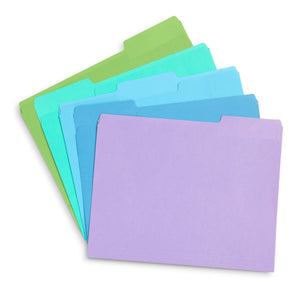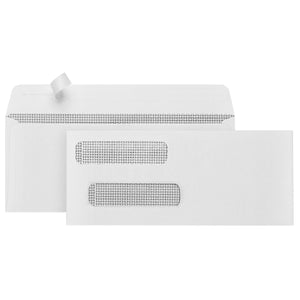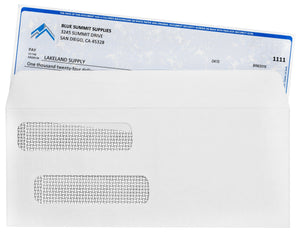Let’s learn how to clean, defrag, and prioritize files! Sounds exciting, right? Organizing, managing, and taking care of the files on your computer may not be a thrill a minute, but it will improve your productivity and your computer’s performance.
In this post, we’ll cover defragging (including answers to what the heck is that? and do you need to do it?), how to clean your computer files to free up space, how to organize your files, and digital folder organization best practices.
Clean, Defrag, and Prioritize Files
Nobody likes a slow computer, and no one wants to spend precious minutes tracking down an errant file. Just like a house, without regular maintenance, your computer gets cluttered, things get lost, and everything falls into general disrepair. In our frustration, it’s easy to blame our computers. But they’re just inanimate objects (for now 🤖 😱.)
If we want our computers to perform optimally and keep track of our files, we’ve got to take care of them. And that involves organization and occasional maintenance.
What is Defragging? (And is it necessary?)
Bear with us, non-techies—we’re about to get into a little computer lingo. To start, “defrag” and “defragging” are short for “defragmentation.” Defragmentation is something your hard drive requires for maintenance and to improve computer performance.
Data being out of order is known as fragmentation. Fragmentation is something that occurs on every computer because files are regularly divided into smaller pieces of data in order to fit on a disk. The more this happens, the more fragmented your data becomes, and the longer it will take for your computer to find an individual file because it has to search multiple areas of the hard drive to compile all the different pieces of data that make up that file. Ipso facto, the slower your computer becomes.
Defragmentation is the process of reorganizing the data on your hard drive so that any pieces of data related to one another are placed in sequential order. To put it very simply, think of a shelf of books or movies. It’s easier to find something if everything is in alphabetical order. Defragging helps your computer easily find what it’s looking for since it doesn’t need to jump all over the place to read one file.

Do you need to defrag your computer?
So, do you need to defrag your computer? The answer is probably not, unless you have a particularly old computer. Mac, Windows 7 and up, and Linux all automatically defrag your hard drive for you.
Great news!
Cleaning Files to Free Up Space
Many of us are familiar with the pop-up startup disk almost full or disk space almost full showing up and distracting us from our work. At first, we’re mystified (but I just emptied my trash!), then we’re annoyed, and then we click X. We’ll deal with it eventually, right?
It’s an unavoidable reality of owning a computer and trying to store all of our work files, photos, and downloads from the last few years in the same place. Unfortunately, there’s just not enough space, and eventually, we all run out. But we may not be running out as quickly as our computer is making us think.
Our computer, whatever its make/model, stores unnecessary duplicates of our files all over the place. And then there are the useless applications we’ve downloaded over the years or the ones that simply came pre-installed on our computer. Do we need them all? Almost certainly not.
Look through your storage at all of the installed programs and applications, especially the ones that are taking up the most space. Are they worth keeping? If not, get rid of them (and remember to empty your trash!)
For Mac users, here’s a more detailed rundown of how to free up space on your Mac.
For PC users, here’s a more detailed rundown of how to free up space on your PC.
If you’re really strapped for space and can’t delete anything else, consider using an external hard drive to store your files. It’s a portable device with tons of extra storage that can attach to a computer wirelessly or through a USB.

External drives also backup your files, which we recommend you do on a regular basis to ensure you’re never at risk of losing your treasured memories, dog photos, or important business documents.
Why is it Important to Organize Digital Files?
Have you ever wasted time looking for a computer file? Have you ever lost a file on your computer? Have you ever gone to search for a file only to have no idea what the file was named in the first place? It’s pretty difficult to track down a file if you don’t know where you saved it or what you named it.
Organizing your computer files with a consistent system has a number of benefits.
Save Time Finding Files
Implementing a consistent organization system helps you find files quickly, ensuring no time is wasted tracking down a file. Even if you can find a file after a short search, that’s still time that could be better spent elsewhere, and depending on how long it takes to find the file you need, your focus could be completely derailed by the interruption.
Never Lose Track of a File
If files aren’t organized and named properly, you may lose them altogether, and losing a file could have various consequences depending on the file’s importance. When you switch from one system to the next or don’t have any system at all for naming files, the search function becomes useless. How do you search for a file when you can’t remember what you named it?
Without the ability to search for files, your last resort may be manually combing through your files one by one—another big waste of time and a near-impossible feat if you store a lot of files on your computer.
Manage Computer Space
When you have a system in place for organizing your files, you’re better able to manage your computer space. You’ll know the exact location of each of your files, what’s taking up space, and how you can make more space if you need to—which is difficult to do when your files are disorganized and all over the place. You’ll also have a better idea of the duplications that could exist as well as applications you aren’t using anymore, all of which can be deleted to free up more space and give you some breathing room.
What’s the Best Way to Organize Digital Files?
There is no best or ideal way to organize your files; the key is choosing a system that works for you and sticking to it. Creating and maintaining a clear system is what counts. Make sure you intentionally and clearly organize and label all files, so you always know where they are, and nothing ever gets lost.
Strategically name your files in a way that makes the most sense to you, and then organize those files into a folder system.
Invoice.pdf isn’t a good name. Which invoice is it? When is it dated? What’s it for?
Invoice30.pdf isn’t much better because you have no context around what the numbers mean.
Instead, you might choose to label the file:
Invoice_Marketing_30Jan2021.pdf
Or
Invoice_Internet_2021Jan30.pdf
Or
Invoice_PaintersCo_30Jan21.pdf
Whatever system you choose, you need to maintain it. Otherwise, you could mix up your files or delete something by mistake, believing it’s a duplicate. Dates are tricky if you don’t label files the same way every time. Did you mean January 12th? Or December 1st?
Look at your existing files to get some digital file organization ideas. What files do you use the most? What files do you need to have quick access to? What files could be grouped together?
You might begin your file organization by separating three folders for Business, Home, and Personal. If you’re only organizing files for a business, you might create a folder for each client, as well as some general business folders for Admin, Finance, Branding, etc.
If you need to access a certain file or folder of files on a regular basis, make sure they aren’t buried too deep in your organizational system. You can also create sidebar shortcuts, so you can access the most important folders with one simple click.
Dos and Don’ts of Digital File Organization
✅ Use one digital file organization system—and stick to that system.
✅ Always clearly and consistently name your files whenever you save something.
✅ Clean your files regularly to remove unnecessary duplications.
✅ If you share a computer with someone, create a separate user for yourself to ensure no one messes up your file organization system.
✅ Create sidebar shortcuts or bookmarks to the folders you use most often.
✅ Use an external hard drive if you need more space for your files, and make sure you follow your organizational system on the drive as well.
✅ Always backup your files in two other locations (Cloud, hard drive, etc.) to ensure you never lose precious data.
❌ Don’t save everything. Consider whether or not you actually need the file before automatically saving it.
❌ Don’t save duplicate files.
❌ Don’t wait until later to clearly name files. Name the file as soon as it's created to ensure you remember exactly what the file is for and where it should be sorted.
❌ Don’t use easily forgettable, complicated abbreviations when naming your files.
❌ Don’t clutter your desktop with distracting file organization.
❌ Don’t create an overly-complicated system with too many subfolders to keep track of.
More From Blue Summit Supplies
💡 What Does Clearing Cache Do? And How to Clear Cache
💡 Stay Secure with a Password Tracker: Free Printable Password Keeper
We strive to give businesses reliable resources that improve productivity, both at home and in the office. Follow our blog for the latest trends, strategies, product comparisons, and more.
If you have any questions or want to talk to someone at Blue Summit Supplies, send us an email or connect with us on Twitter, Facebook, or Instagram.
 For more informative articles about office supplies, subscribe to our email newsletter!
For more informative articles about office supplies, subscribe to our email newsletter!
Never fear, you won't begin receiving daily sales emails that belong in a spam folder. Instead, we promise a fun weekly roundup of our latest blog posts and great finds from across the web. And if you lose interest, it's always easy to unsubscribe with a single click.










